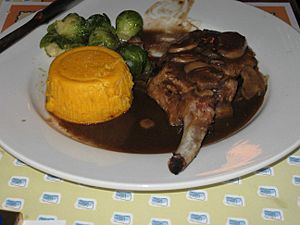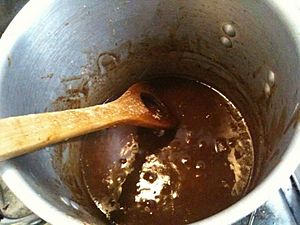Demi-glace facts for kids

A pork chop with brussels sprouts, a sweet potato purée, and a mushroom demi-glace
|
|
| Type | Sauce |
|---|---|
| Place of origin | France |
| Main ingredients | beef or chicken stock |
| Variations | demi-glace au bœuf, demi-glace au poulet |
Demi-glace is a rich, flavorful brown sauce from French cuisine. It can be used on its own or as a base for other sauces. The name comes from the French word glace, which means "icing" or "glaze" when talking about sauces.
Traditionally, demi-glace is made by mixing equal parts of a thick Espagnole sauce and a rich brown stock. This mixture is then cooked down, or "reduced," until it is much thicker. After that, it is strained to remove any small bits and often finished with a splash of sherry wine.
Sometimes, demi-glace is made with beef or chicken stock instead of the traditional veal stock. These are called "beef demi-glace" (demi-glace au bœuf) or "chicken demi-glace" (demi-glace au poulet). If someone just says "demi-glace," it usually means it's made with veal stock.
How Chefs Make Demi-Glace
A famous French chef named Auguste Escoffier helped create many standard French recipes. He also refined how French cooking is done. He gave us the basic recipe for demi-glace.
Making demi-glace starts with a good brown stock. This stock is kept warm while a special sauce called Espagnole is prepared. Once the Espagnole sauce is ready, the warm brown stock is added to it in equal amounts.
The mixture is then slowly cooked down. This process is called "reduction." It makes the sauce thicker and concentrates its flavors. Demi-glace can be stored for a long time. It lasts about six months in the fridge or almost forever if frozen.
Why Demi-Glace is Special
Making traditional demi-glace takes a lot of time and effort. Because of this, some chefs use simpler versions. For example, they might use a "jus lié" made from veal stock. The American cookbook author Julia Child even called a simpler version a "semi-demi-glace." This version does not use the Espagnole sauce.
Even today, many chefs who cook fancy French meals (called haute cuisine) still make demi-glace from scratch in their own kitchens. There are also special concentrates and mixes available for professional kitchens. These help chefs save time while still getting a similar rich flavor.
See also
 In Spanish: Demi-glace para niños
In Spanish: Demi-glace para niños
 | Stephanie Wilson |
 | Charles Bolden |
 | Ronald McNair |
 | Frederick D. Gregory |


